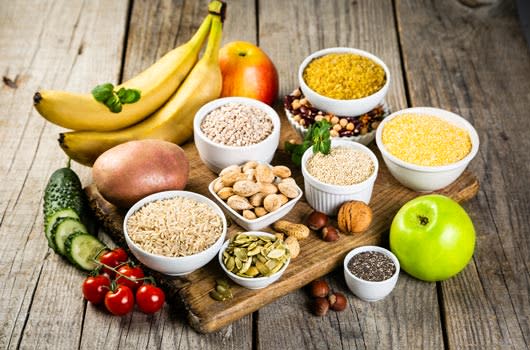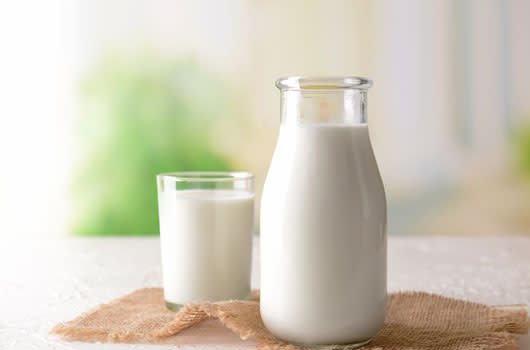Nutritional needs and ageing
Author Max Gowland, PhD Last updated 2nd December 2020 Over Fifties health

When you reach middle age, you go through a variety of changes. Your body doesn’t behave as it used to, hormones start to become more out of control, and we can become deficient in several important nutrients.
Common ailments such as obesity, cardiovascular disease and diabetes become more frequent with increased age. All these problems have an association with the foods we eat and following a healthy diet throughout your life will help reduce these problems, allowing you to have as healthy a journey as possible, as you get older. So, let’s take a closer look to what actually changes as we age, and the part nutrition plays in this.
Your appetite changes
As we reach mid-life, our cravings can increase. These cravings can happen because of chemical reactions. Our bodies can become less sensitive to insulin and we can no longer deal with the same amount of carbohydrates as in our younger days.
It’s these changes that increase our appetite for certain ‘naughty’ reward foods, creating a negative effect on our body weight and increasing the risk of developing type 2 diabetes.
Natural changes happen again in your mid-60s as when the metabolism declines our appetites follow the same pattern. With age, our taste buds and sense of smell can reduce – often the reason people are pulled towards foods that are high in sugar, salt and fat.
You’ll need fewer calories
Your body’s ability to burn calories (metabolism) slows down as you age. The aging process makes us start to slow down, and if we don’t reduce the amount we eat, we’ll easily gain weight. To stop this and reduce the risk of obesity, we must consume fewer calories1.
As you age it’s so easy to gain extra fat around the belly area. This is especially true after middle age. When women go through menopause their oestrogen levels decrease and with men, their testosterone decreases as well – all aspects that promote belly fat storage.
We may need fewer calories, but we need more nutrients than we did when we were younger. Consuming a healthy diet can help with nutrient deficiencies without adding inches to your waistline.
Constipation may become more common
Our digestion can take a big hit as we age. The production of stomach acid decreases, stopping food from being broken down properly. Less movement can stop things flowing through our digestive tract and prescribed medication for other ailments can all have a negative impact on our bowel movements3.
As food is passed through the body, it goes through a series of muscle contractions. This process can slow down as we age. When food moves slower through your colon, more water gets absorbed from food waste, the issue that causes constipation.
Gastroesophageal reflux disease (GERD) can also occur in older adults. Our stomach acid can back up into the oesophagus and cause heartburn and other issues. If you’re carrying extra weight, it can increase the risk of suffering from these symptoms, which is why it’s so important to keep your weight under control as you age4.
Dehydration becomes more likely

As we age, our brains can become less sensitive to water changes, making it harder to recognise when we are thirsty. Our kidneys also play a part in this as they can lose their function to conserve water.
Dehydration can come with some serious consequences. It can make us feel fatigued, lose concentration, reduce our blood pressure and can increase the feeling of weakness. Suffering from long-term dehydration can reduce the ability to absorb any medication, ultimately worsening your medical condition5.
Your body loses muscle and bones tend to shrink
If we don’t look after ourselves as we age, we can increase the risks of sarcopenia, a loss of muscle mass and strength. Studies show that the average adult loses 3-8% of their muscle mass each decade after the age of 306.
Sarcopenia can make you feel weak, increase the chances of fractures and has an overall impact on poor health among the elderly.
Our bones change through the ageing process, increasing fragility and brittleness because they shrink in size and density. You become more susceptible to fractures and you can even come a little shorter because the cartilage in the joints gets worn down.
Making healthier choices
Healthy eating becomes more important as you age as the changes that happen to your body alter the way you digest food.
Fortunately, by making some positive changes to what you eat, you can improve your diet and lifestyle, which will lead to a healthy journey into mature age.
Eat more fibre

Try to include more fibre in your diet to aid digestion and reduce the chances of constipation. Fibre can be found in lots of fruit and vegetables, nuts, grains and cereals. Eating a diet rich in fibre can lead to lower cholesterol, stable blood sugar levels and it makes it easier to manage a healthy weight.
Include more calcium in your diet

For bone health, increase the amount of calcium you consume. Calcium can be found in dairy products, as well as dark green leafy vegetables such as kale and spinach, broccoli and fish such as sardines.
Include lean protein

Protein is another important nutrient as you age. It can help your body maintain muscle and prevent the onset of sarcopenia7. You can get protein from food sources such as lean meat, fish, milk, nuts, seeds, tofu, beans and legumes.
Increase your vitamin D and B12 intake
Increase your intake of vitamin D and vitamin B12 by adding fish to your diet such as salmon or tuna, the occasional nice cut of steak or even some simple boiled eggs to consume your daily intake. Mushrooms are also a rich source of vitamin d.
Add supplements to your diet
According to data from Public Health England, the majority of older adults are failing to get the recommended intakes across many vitamins and minerals. If you struggle to reach the recommended daily allowance, it could lead to chronic complaints later in life.
Supplements are a great way to make it easier to stay active, get more active and feel younger for longer.
Ailsa Hichens, a registered nutritional therapist and health coach says, “I am a believer in targeted supplements. I believe that everyone can get everything they need from food, provided that they have nothing wrong with them to start with and also that they eat a really good diet. I suspect that there are very few people who fall into this category and, therefore, some specific supplements are helpful depending on what's either wrong or to maintain general health”.
References
1. Shimokata H, Kuzuya F. Aging, basal metabolic rate, and nutrition. Nihon Ronen Igakkai Zasshi. 1993 Jul;30(7):572-6. Japanese. doi: 10.3143/geriatrics.30.572. PMID: 8361073.
2. Mathus-Vliegen EM. Obesity and the elderly. J Clin Gastroenterol. 2012 Aug;46(7):533-44. doi: 10.1097/MCG.0b013e31825692ce. PMID: 22772735.
3. Rao SS, Go JT. Update on the management of constipation in the elderly: new treatment options. Clin Interv Aging. 2010 Aug 9;5:163-71. doi: 10.2147/cia.s8100. PMID: 20711435; PMCID: PMC2920196.
4. Conway B. Aging and Digestive Health. WebMD Digestive disorders.
5. British Nutrition Foundation. Dehydration in the elderly. Nutrition science.
6. English KL, Paddon-Jones D. Protecting muscle mass and function in older adults during bed rest. Curr Opin Clin Nutr Metab Care. 2010 Jan;13(1):34-9. doi: 10.1097/MCO.0b013e328333aa66. PMID: 19898232; PMCID: PMC3276215.
7. Deutz NE, Bauer JM, Barazzoni R et al. Protein intake and exercise for optimal muscle function with aging: recommendations from the ESPEN Expert Group. Clin Nutr. 2014 Dec;33(6):929-36. doi: 10.1016/j.clnu.2014.04.007. Epub 2014 Apr 24. PMID: 24814383; PMCID: PMC4208946.
